


2019 Passat Variant (B8, facelift 2019)
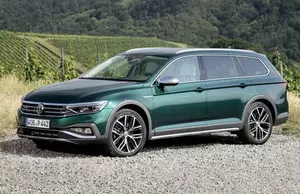
2019 Passat Alltrack (B8, facelift 2019)
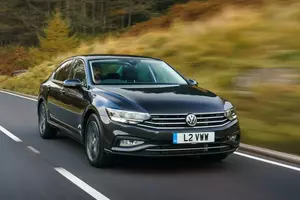
2019 Passat (B8, facelift 2019)
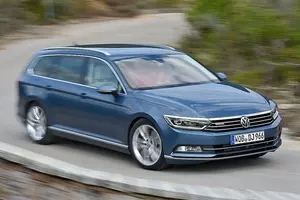
2015 Passat Variant (B8)
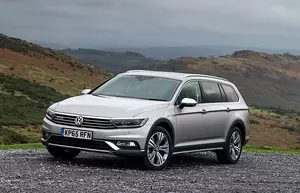
2015 Passat Alltrack (B8)
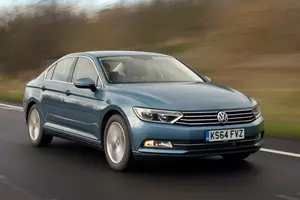
2015 Passat (B8)
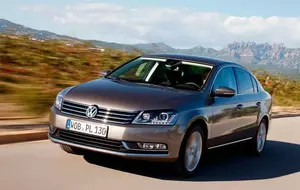
2010 Passat (B7)
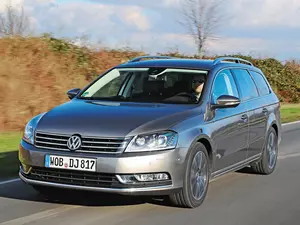
2010 Passat Variant (B7)
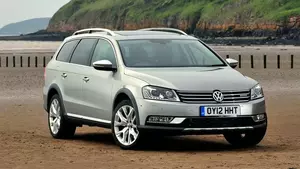
2010 Passat Alltrack (B7)
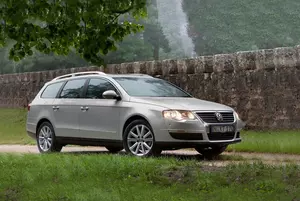
2005 Passat Variant (B6)
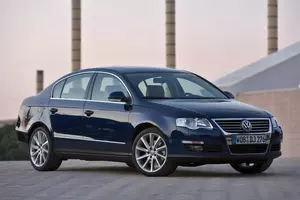
2005 Passat (B6)
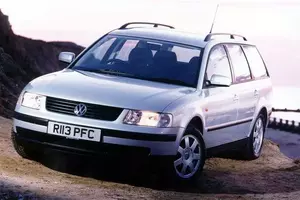
1997 Passat Variant (B5)
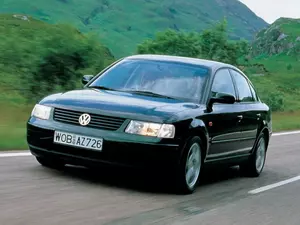
1996 Passat (B5)

1988 Passat Variant B3,B4

1988 Passat (B3, B4)

1985 Passat Hatchback (B2; facelift 1985)

1981 Passat Variant (B2)
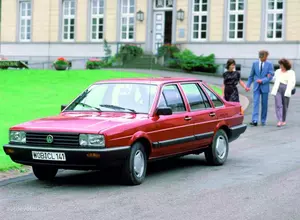
1981 Passat (B2)
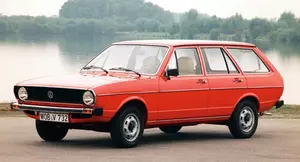
1973 Passat Variant (B1)
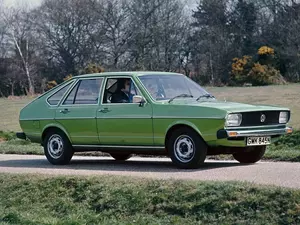
1973 Passat (B1)
In 2019 Volkswagen Passat horsepower was between 120 and 190 hp or 88 and 140 kW.
Volkswagen Passat horsepower to weight ratio in 2019 is shown in the chart.
Volkswagen Passat horsepower to CC ratio is shown in this graph
| Vehicle | Power (difference from average) | Power to torque ratio | Power per passenger | Power to 1 cylinder | Power to consumption rate |
|---|---|---|---|---|---|
| 2.0 TDI |
150 hp / 110 kw
(-13%) |
+56% | 30 hp / 22 kw | 38 hp / 28 kw | 75 points |
| 1.6 TDI |
120 hp / 88 kw
(-31%) |
+52% | 24 hp / 18 kw | 30 hp / 22 kw | 75 points |
| 2.0 TSI |
190 hp / 140 kw
(+10%) |
+41% | 38 hp / 28 kw | 48 hp / 35 kw | 95 points |
| 1.5 TSI |
150 hp / 110 kw
(-13%) |
+40% | 30 hp / 22 kw | 38 hp / 28 kw | 100 points |
| Vehicle | 2.0 TDI |
|---|---|
| Power (difference from average) |
150 hp / 110 kw
(-13%) |
| Power to torque ratio | 56 % |
| Power per passenger | 30 hp / 22 kw |
| Power to 1 cylinder | 38 hp / 28 kw |
| Power to consumption rate | 75 points |
| Vehicle | 1.6 TDI |
| Power (difference from average) |
120 hp / 88 kw
(-31%) |
| Power to torque ratio | 52 % |
| Power per passenger | 24 hp / 18 kw |
| Power to 1 cylinder | 30 hp / 22 kw |
| Power to consumption rate | 75 points |
| Vehicle | 2.0 TSI |
| Power (difference from average) |
190 hp / 140 kw
(+10%) |
| Power to torque ratio | 41 % |
| Power per passenger | 38 hp / 28 kw |
| Power to 1 cylinder | 48 hp / 35 kw |
| Power to consumption rate | 95 points |
| Vehicle | 1.5 TSI |
| Power (difference from average) |
150 hp / 110 kw
(-13%) |
| Power to torque ratio | 40 % |
| Power per passenger | 30 hp / 22 kw |
| Power to 1 cylinder | 38 hp / 28 kw |
| Power to consumption rate | 100 points |
In 2019 Volkswagen Passat horsepower was between 190 and 272 hp or 140 and 200 kW.
Volkswagen Passat horsepower to weight ratio in 2019 is shown in the chart.
Volkswagen Passat horsepower to CC ratio is shown in this graph
| Vehicle | Power (difference from average) | Power to torque ratio | Power per passenger | Power to 1 cylinder | Power to consumption rate |
|---|---|---|---|---|---|
| 2.0 TDI |
190 hp / 140 kw
(+10%) |
+53% | 38 hp / 28 kw | 48 hp / 35 kw | 95 points |
| 2.0 TSI |
272 hp / 200 kw
(+57%) |
+22% | 54 hp / 40 kw | 68 hp / 50 kw | 136 points |
| Vehicle | 2.0 TDI |
|---|---|
| Power (difference from average) |
190 hp / 140 kw
(+10%) |
| Power to torque ratio | 53 % |
| Power per passenger | 38 hp / 28 kw |
| Power to 1 cylinder | 48 hp / 35 kw |
| Power to consumption rate | 95 points |
| Vehicle | 2.0 TSI |
| Power (difference from average) |
272 hp / 200 kw
(+57%) |
| Power to torque ratio | 22 % |
| Power per passenger | 54 hp / 40 kw |
| Power to 1 cylinder | 68 hp / 50 kw |
| Power to consumption rate | 136 points |
In 2019 Volkswagen Passat horsepower was between 120 and 272 hp or 88 and 200 kW.
Volkswagen Passat horsepower to weight ratio in 2019 is shown in the chart.
Volkswagen Passat horsepower to CC ratio is shown in this graph
| Vehicle | Power (difference from average) | Power to torque ratio | Power per passenger | Power to 1 cylinder | Power to consumption rate |
|---|---|---|---|---|---|
| 2.0 TSI |
272 hp / 200 kw
(+57%) |
+22% | 54 hp / 40 kw | 68 hp / 50 kw | 136 points |
| 1.6 TDI |
120 hp / 88 kw
(-31%) |
+52% | 24 hp / 18 kw | 30 hp / 22 kw | 75 points |
| 2.0 TDI |
150 hp / 110 kw
(-13%) |
+58% | 30 hp / 22 kw | 38 hp / 28 kw | 75 points |
| 1.5 TSI |
150 hp / 110 kw
(-13%) |
+40% | 30 hp / 22 kw | 38 hp / 28 kw | 100 points |
| Vehicle | 2.0 TSI |
|---|---|
| Power (difference from average) |
272 hp / 200 kw
(+57%) |
| Power to torque ratio | 22 % |
| Power per passenger | 54 hp / 40 kw |
| Power to 1 cylinder | 68 hp / 50 kw |
| Power to consumption rate | 136 points |
| Vehicle | 1.6 TDI |
| Power (difference from average) |
120 hp / 88 kw
(-31%) |
| Power to torque ratio | 52 % |
| Power per passenger | 24 hp / 18 kw |
| Power to 1 cylinder | 30 hp / 22 kw |
| Power to consumption rate | 75 points |
| Vehicle | 2.0 TDI |
| Power (difference from average) |
150 hp / 110 kw
(-13%) |
| Power to torque ratio | 58 % |
| Power per passenger | 30 hp / 22 kw |
| Power to 1 cylinder | 38 hp / 28 kw |
| Power to consumption rate | 75 points |
| Vehicle | 1.5 TSI |
| Power (difference from average) |
150 hp / 110 kw
(-13%) |
| Power to torque ratio | 40 % |
| Power per passenger | 30 hp / 22 kw |
| Power to 1 cylinder | 38 hp / 28 kw |
| Power to consumption rate | 100 points |
In 2015 Volkswagen Passat horsepower was between 120 and 272 hp or 88 and 200 kW.
Volkswagen Passat horsepower to weight ratio in 2015 is shown in the chart.
Volkswagen Passat horsepower to CC ratio is shown in this graph
| Vehicle | Power (difference from average) | Power to torque ratio | Power per passenger | Power to 1 cylinder | Power to consumption rate |
|---|---|---|---|---|---|
| 1.4 TSI |
150 hp / 110 kw
(-13%) |
+40% | 30 hp / 22 kw | 38 hp / 28 kw | 107.1 points |
| 1.6 TDI |
120 hp / 88 kw
(-31%) |
+52% | 24 hp / 18 kw | 30 hp / 22 kw | 75 points |
| 2.0 TDI |
150 hp / 110 kw
(-13%) |
+56% | 30 hp / 22 kw | 38 hp / 28 kw | 75 points |
| 2.0 BiTDI |
240 hp / 177 kw
(+39%) |
+52% | 48 hp / 35 kw | 60 hp / 44 kw | 120 points |
| 1.8 TSI |
180 hp / 132 kw
(+4%) |
+28% | 36 hp / 26 kw | 45 hp / 33 kw | 100 points |
| 2.0 TSI |
272 hp / 200 kw
(+57%) |
+22% | 54 hp / 40 kw | 68 hp / 50 kw | 136 points |
| GTE 1.4 TSI |
156 hp / 115 kw
(-10%) |
+38% | 31 hp / 23 kw | 39 hp / 29 kw | 111.4 points |
| 1.5 TSI |
150 hp / 110 kw
(-13%) |
+40% | 30 hp / 22 kw | 38 hp / 28 kw | 100 points |
| Vehicle | 1.4 TSI |
|---|---|
| Power (difference from average) |
150 hp / 110 kw
(-13%) |
| Power to torque ratio | 40 % |
| Power per passenger | 30 hp / 22 kw |
| Power to 1 cylinder | 38 hp / 28 kw |
| Power to consumption rate | 107.1 points |
| Vehicle | 1.6 TDI |
| Power (difference from average) |
120 hp / 88 kw
(-31%) |
| Power to torque ratio | 52 % |
| Power per passenger | 24 hp / 18 kw |
| Power to 1 cylinder | 30 hp / 22 kw |
| Power to consumption rate | 75 points |
| Vehicle | 2.0 TDI |
| Power (difference from average) |
150 hp / 110 kw
(-13%) |
| Power to torque ratio | 56 % |
| Power per passenger | 30 hp / 22 kw |
| Power to 1 cylinder | 38 hp / 28 kw |
| Power to consumption rate | 75 points |
| Vehicle | 2.0 BiTDI |
| Power (difference from average) |
240 hp / 177 kw
(+39%) |
| Power to torque ratio | 52 % |
| Power per passenger | 48 hp / 35 kw |
| Power to 1 cylinder | 60 hp / 44 kw |
| Power to consumption rate | 120 points |
| Vehicle | 1.8 TSI |
| Power (difference from average) |
180 hp / 132 kw
(+4%) |
| Power to torque ratio | 28 % |
| Power per passenger | 36 hp / 26 kw |
| Power to 1 cylinder | 45 hp / 33 kw |
| Power to consumption rate | 100 points |
| Vehicle | 2.0 TSI |
| Power (difference from average) |
272 hp / 200 kw
(+57%) |
| Power to torque ratio | 22 % |
| Power per passenger | 54 hp / 40 kw |
| Power to 1 cylinder | 68 hp / 50 kw |
| Power to consumption rate | 136 points |
| Vehicle | GTE 1.4 TSI |
| Power (difference from average) |
156 hp / 115 kw
(-10%) |
| Power to torque ratio | 38 % |
| Power per passenger | 31 hp / 23 kw |
| Power to 1 cylinder | 39 hp / 29 kw |
| Power to consumption rate | 111.4 points |
| Vehicle | 1.5 TSI |
| Power (difference from average) |
150 hp / 110 kw
(-13%) |
| Power to torque ratio | 40 % |
| Power per passenger | 30 hp / 22 kw |
| Power to 1 cylinder | 38 hp / 28 kw |
| Power to consumption rate | 100 points |
In 2015 Volkswagen Passat horsepower was between 190 and 272 hp or 140 and 200 kW.
Volkswagen Passat horsepower to weight ratio in 2015 is shown in the chart.
Volkswagen Passat horsepower to CC ratio is shown in this graph
| Vehicle | Power (difference from average) | Power to torque ratio | Power per passenger | Power to 1 cylinder | Power to consumption rate |
|---|---|---|---|---|---|
| 2.0 TDI |
190 hp / 140 kw
(+10%) |
+53% | 38 hp / 28 kw | 48 hp / 35 kw | 95 points |
| 2.0 TSI |
272 hp / 200 kw
(+57%) |
+22% | 54 hp / 40 kw | 68 hp / 50 kw | 136 points |
| 2.0 BiTDI |
240 hp / 177 kw
(+39%) |
+52% | 48 hp / 35 kw | 60 hp / 44 kw | 120 points |
| Vehicle | 2.0 TDI |
|---|---|
| Power (difference from average) |
190 hp / 140 kw
(+10%) |
| Power to torque ratio | 53 % |
| Power per passenger | 38 hp / 28 kw |
| Power to 1 cylinder | 48 hp / 35 kw |
| Power to consumption rate | 95 points |
| Vehicle | 2.0 TSI |
| Power (difference from average) |
272 hp / 200 kw
(+57%) |
| Power to torque ratio | 22 % |
| Power per passenger | 54 hp / 40 kw |
| Power to 1 cylinder | 68 hp / 50 kw |
| Power to consumption rate | 136 points |
| Vehicle | 2.0 BiTDI |
| Power (difference from average) |
240 hp / 177 kw
(+39%) |
| Power to torque ratio | 52 % |
| Power per passenger | 48 hp / 35 kw |
| Power to 1 cylinder | 60 hp / 44 kw |
| Power to consumption rate | 120 points |
In 2015 Volkswagen Passat horsepower was between 120 and 272 hp or 88 and 200 kW.
Volkswagen Passat horsepower to weight ratio in 2015 is shown in the chart.
Volkswagen Passat horsepower to CC ratio is shown in this graph
| Vehicle | Power (difference from average) | Power to torque ratio | Power per passenger | Power to 1 cylinder | Power to consumption rate |
|---|---|---|---|---|---|
| 1.6 TDI |
120 hp / 88 kw
(-31%) |
+52% | 24 hp / 18 kw | 30 hp / 22 kw | 75 points |
| 1.4 TSI |
150 hp / 110 kw
(-13%) |
+40% | 30 hp / 22 kw | 38 hp / 28 kw | 107.1 points |
| 2.0 TDI |
190 hp / 140 kw
(+10%) |
+53% | 38 hp / 28 kw | 48 hp / 35 kw | 95 points |
| 2.0 BiTDI |
240 hp / 177 kw
(+39%) |
+52% | 48 hp / 35 kw | 60 hp / 44 kw | 120 points |
| 1.8 TSI |
180 hp / 132 kw
(+4%) |
+44% | 36 hp / 26 kw | 45 hp / 33 kw | 100 points |
| 2.0 TSI |
272 hp / 200 kw
(+57%) |
+22% | 54 hp / 40 kw | 68 hp / 50 kw | 136 points |
| GTE 1.4 TSI |
156 hp / 115 kw
(-10%) |
+38% | 31 hp / 23 kw | 39 hp / 29 kw | 111.4 points |
| 1.5 TSI |
150 hp / 110 kw
(-13%) |
+40% | 30 hp / 22 kw | 38 hp / 28 kw | 100 points |
| Vehicle | 1.6 TDI |
|---|---|
| Power (difference from average) |
120 hp / 88 kw
(-31%) |
| Power to torque ratio | 52 % |
| Power per passenger | 24 hp / 18 kw |
| Power to 1 cylinder | 30 hp / 22 kw |
| Power to consumption rate | 75 points |
| Vehicle | 1.4 TSI |
| Power (difference from average) |
150 hp / 110 kw
(-13%) |
| Power to torque ratio | 40 % |
| Power per passenger | 30 hp / 22 kw |
| Power to 1 cylinder | 38 hp / 28 kw |
| Power to consumption rate | 107.1 points |
| Vehicle | 2.0 TDI |
| Power (difference from average) |
190 hp / 140 kw
(+10%) |
| Power to torque ratio | 53 % |
| Power per passenger | 38 hp / 28 kw |
| Power to 1 cylinder | 48 hp / 35 kw |
| Power to consumption rate | 95 points |
| Vehicle | 2.0 BiTDI |
| Power (difference from average) |
240 hp / 177 kw
(+39%) |
| Power to torque ratio | 52 % |
| Power per passenger | 48 hp / 35 kw |
| Power to 1 cylinder | 60 hp / 44 kw |
| Power to consumption rate | 120 points |
| Vehicle | 1.8 TSI |
| Power (difference from average) |
180 hp / 132 kw
(+4%) |
| Power to torque ratio | 44 % |
| Power per passenger | 36 hp / 26 kw |
| Power to 1 cylinder | 45 hp / 33 kw |
| Power to consumption rate | 100 points |
| Vehicle | 2.0 TSI |
| Power (difference from average) |
272 hp / 200 kw
(+57%) |
| Power to torque ratio | 22 % |
| Power per passenger | 54 hp / 40 kw |
| Power to 1 cylinder | 68 hp / 50 kw |
| Power to consumption rate | 136 points |
| Vehicle | GTE 1.4 TSI |
| Power (difference from average) |
156 hp / 115 kw
(-10%) |
| Power to torque ratio | 38 % |
| Power per passenger | 31 hp / 23 kw |
| Power to 1 cylinder | 39 hp / 29 kw |
| Power to consumption rate | 111.4 points |
| Vehicle | 1.5 TSI |
| Power (difference from average) |
150 hp / 110 kw
(-13%) |
| Power to torque ratio | 40 % |
| Power per passenger | 30 hp / 22 kw |
| Power to 1 cylinder | 38 hp / 28 kw |
| Power to consumption rate | 100 points |
In 2010 Volkswagen Passat horsepower was between 150 and 300 hp or 110 and 221 kW.
Volkswagen Passat horsepower to weight ratio in 2010 is shown in the chart.
Volkswagen Passat horsepower to CC ratio is shown in this graph
| Vehicle | Power (difference from average) | Power to torque ratio | Power per passenger | Power to 1 cylinder | Power to consumption rate |
|---|---|---|---|---|---|
| 1.8 TSI |
160 hp / 118 kw
(-8%) |
- | 32 hp / 24 kw | 40 hp / 30 kw | 88.9 points |
| 2.0 TSI |
211 hp / 155 kw
(+22%) |
+25% | 42 hp / 31 kw | 53 hp / 39 kw | 105.5 points |
| 1.4 TSI |
150 hp / 110 kw
(-13%) |
+32% | 30 hp / 22 kw | 38 hp / 28 kw | 107.1 points |
| 3.6 V6 FSI |
300 hp / 221 kw
(+73%) |
+14% | 60 hp / 44 kw | 50 hp / 37 kw | 83.3 points |
| 2.0 TDI |
170 hp / 125 kw
(-2%) |
+51% | 34 hp / 25 kw | 43 hp / 31 kw | 85 points |
| Vehicle | 1.8 TSI |
|---|---|
| Power (difference from average) |
160 hp / 118 kw
(-8%) |
| Power to torque ratio | - |
| Power per passenger | 32 hp / 24 kw |
| Power to 1 cylinder | 40 hp / 30 kw |
| Power to consumption rate | 88.9 points |
| Vehicle | 2.0 TSI |
| Power (difference from average) |
211 hp / 155 kw
(+22%) |
| Power to torque ratio | 25 % |
| Power per passenger | 42 hp / 31 kw |
| Power to 1 cylinder | 53 hp / 39 kw |
| Power to consumption rate | 105.5 points |
| Vehicle | 1.4 TSI |
| Power (difference from average) |
150 hp / 110 kw
(-13%) |
| Power to torque ratio | 32 % |
| Power per passenger | 30 hp / 22 kw |
| Power to 1 cylinder | 38 hp / 28 kw |
| Power to consumption rate | 107.1 points |
| Vehicle | 3.6 V6 FSI |
| Power (difference from average) |
300 hp / 221 kw
(+73%) |
| Power to torque ratio | 14 % |
| Power per passenger | 60 hp / 44 kw |
| Power to 1 cylinder | 50 hp / 37 kw |
| Power to consumption rate | 83.3 points |
| Vehicle | 2.0 TDI |
| Power (difference from average) |
170 hp / 125 kw
(-2%) |
| Power to torque ratio | 51 % |
| Power per passenger | 34 hp / 25 kw |
| Power to 1 cylinder | 43 hp / 31 kw |
| Power to consumption rate | 85 points |
In 2010 Volkswagen Passat horsepower was between 150 and 300 hp or 110 and 221 kW.
Volkswagen Passat horsepower to weight ratio in 2010 is shown in the chart.
Volkswagen Passat horsepower to CC ratio is shown in this graph
| Vehicle | Power (difference from average) | Power to torque ratio | Power per passenger | Power to 1 cylinder | Power to consumption rate |
|---|---|---|---|---|---|
| 2.0 TSI |
211 hp / 155 kw
(+22%) |
+25% | 42 hp / 31 kw | 53 hp / 39 kw | 105.5 points |
| 1.8 TSI |
160 hp / 118 kw
(-8%) |
- | 32 hp / 24 kw | 40 hp / 30 kw | 88.9 points |
| 3.6 V6 FSI |
300 hp / 221 kw
(+73%) |
+14% | 60 hp / 44 kw | 50 hp / 37 kw | 83.3 points |
| 1.4 TSI |
150 hp / 110 kw
(-13%) |
- | 30 hp / 22 kw | 38 hp / 28 kw | 107.1 points |
| 2.0 TDI |
170 hp / 125 kw
(-2%) |
+51% | 34 hp / 25 kw | 43 hp / 31 kw | 85 points |
| Vehicle | 2.0 TSI |
|---|---|
| Power (difference from average) |
211 hp / 155 kw
(+22%) |
| Power to torque ratio | 25 % |
| Power per passenger | 42 hp / 31 kw |
| Power to 1 cylinder | 53 hp / 39 kw |
| Power to consumption rate | 105.5 points |
| Vehicle | 1.8 TSI |
| Power (difference from average) |
160 hp / 118 kw
(-8%) |
| Power to torque ratio | - |
| Power per passenger | 32 hp / 24 kw |
| Power to 1 cylinder | 40 hp / 30 kw |
| Power to consumption rate | 88.9 points |
| Vehicle | 3.6 V6 FSI |
| Power (difference from average) |
300 hp / 221 kw
(+73%) |
| Power to torque ratio | 14 % |
| Power per passenger | 60 hp / 44 kw |
| Power to 1 cylinder | 50 hp / 37 kw |
| Power to consumption rate | 83.3 points |
| Vehicle | 1.4 TSI |
| Power (difference from average) |
150 hp / 110 kw
(-13%) |
| Power to torque ratio | - |
| Power per passenger | 30 hp / 22 kw |
| Power to 1 cylinder | 38 hp / 28 kw |
| Power to consumption rate | 107.1 points |
| Vehicle | 2.0 TDI |
| Power (difference from average) |
170 hp / 125 kw
(-2%) |
| Power to torque ratio | 51 % |
| Power per passenger | 34 hp / 25 kw |
| Power to 1 cylinder | 43 hp / 31 kw |
| Power to consumption rate | 85 points |
In 2010 Volkswagen Passat horsepower was between 160 and 210 hp or 118 and 154 kW.
Volkswagen Passat horsepower to weight ratio in 2010 is shown in the chart.
Volkswagen Passat horsepower to CC ratio is shown in this graph
| Vehicle | Power (difference from average) | Power to torque ratio | Power per passenger | Power to 1 cylinder | Power to consumption rate |
|---|---|---|---|---|---|
| 1.8 TSI |
160 hp / 118 kw
(-8%) |
+36% | 32 hp / 24 kw | 40 hp / 30 kw | 88.9 points |
| 2.0 TDI |
177 hp / 130 kw
(+2%) |
+53% | 35 hp / 26 kw | 44 hp / 33 kw | 88.5 points |
| 2.0 TSI |
210 hp / 154 kw
(+21%) |
+25% | 42 hp / 31 kw | 53 hp / 39 kw | 105 points |
| Vehicle | 1.8 TSI |
|---|---|
| Power (difference from average) |
160 hp / 118 kw
(-8%) |
| Power to torque ratio | 36 % |
| Power per passenger | 32 hp / 24 kw |
| Power to 1 cylinder | 40 hp / 30 kw |
| Power to consumption rate | 88.9 points |
| Vehicle | 2.0 TDI |
| Power (difference from average) |
177 hp / 130 kw
(+2%) |
| Power to torque ratio | 53 % |
| Power per passenger | 35 hp / 26 kw |
| Power to 1 cylinder | 44 hp / 33 kw |
| Power to consumption rate | 88.5 points |
| Vehicle | 2.0 TSI |
| Power (difference from average) |
210 hp / 154 kw
(+21%) |
| Power to torque ratio | 25 % |
| Power per passenger | 42 hp / 31 kw |
| Power to 1 cylinder | 53 hp / 39 kw |
| Power to consumption rate | 105 points |
In 2005 Volkswagen Passat horsepower was between 102 and 250 hp or 75 and 184 kW.
Volkswagen Passat horsepower to weight ratio in 2005 is shown in the chart.
Volkswagen Passat horsepower to CC ratio is shown in this graph
| Vehicle | Power (difference from average) | Power to torque ratio | Power per passenger | Power to 1 cylinder | Power to consumption rate |
|---|---|---|---|---|---|
| 1.9 16V TDI |
140 hp / 103 kw
(-19%) |
+56% | 28 hp / 21 kw | 35 hp / 26 kw | 70 points |
| 2.0 16V TDI |
170 hp / 125 kw
(-2%) |
+51% | 34 hp / 25 kw | 43 hp / 31 kw | 85 points |
| 1.6i 16V FSI |
115 hp / 85 kw
(-34%) |
+26% | 23 hp / 17 kw | 29 hp / 21 kw | 71.9 points |
| 2.0i 16V FSI |
150 hp / 110 kw
(-13%) |
+25% | 30 hp / 22 kw | 38 hp / 28 kw | 75 points |
| 2.0i 16V TFSI |
200 hp / 147 kw
(+16%) |
+29% | 40 hp / 29 kw | 50 hp / 37 kw | 100 points |
| 1.4 TSI |
122 hp / 90 kw
(-29%) |
+39% | 24 hp / 18 kw | 31 hp / 23 kw | 87.1 points |
| 1.8 TSI |
150 hp / 110 kw
(-13%) |
+29% | 30 hp / 22 kw | 38 hp / 28 kw | 83.3 points |
| 1.6 i |
102 hp / 75 kw
(-41%) |
+31% | 20 hp / 15 kw | 26 hp / 19 kw | 63.8 points |
| 1.9 TDI PDE |
105 hp / 77 kw
(-39%) |
+58% | 21 hp / 15 kw | 26 hp / 19 kw | 55.3 points |
| 2.0 i 16V FSI 4WD |
150 hp / 110 kw
(-13%) |
+25% | 30 hp / 22 kw | 38 hp / 28 kw | 75 points |
| 2.0 TDI |
140 hp / 103 kw
(-19%) |
+56% | 28 hp / 21 kw | 35 hp / 26 kw | 70 points |
| 3.2 i V6 24V FSI 4WD |
250 hp / 184 kw
(+45%) |
+24% | 50 hp / 37 kw | 42 hp / 31 kw | 78.1 points |
| Vehicle | 1.9 16V TDI |
|---|---|
| Power (difference from average) |
140 hp / 103 kw
(-19%) |
| Power to torque ratio | 56 % |
| Power per passenger | 28 hp / 21 kw |
| Power to 1 cylinder | 35 hp / 26 kw |
| Power to consumption rate | 70 points |
| Vehicle | 2.0 16V TDI |
| Power (difference from average) |
170 hp / 125 kw
(-2%) |
| Power to torque ratio | 51 % |
| Power per passenger | 34 hp / 25 kw |
| Power to 1 cylinder | 43 hp / 31 kw |
| Power to consumption rate | 85 points |
| Vehicle | 1.6i 16V FSI |
| Power (difference from average) |
115 hp / 85 kw
(-34%) |
| Power to torque ratio | 26 % |
| Power per passenger | 23 hp / 17 kw |
| Power to 1 cylinder | 29 hp / 21 kw |
| Power to consumption rate | 71.9 points |
| Vehicle | 2.0i 16V FSI |
| Power (difference from average) |
150 hp / 110 kw
(-13%) |
| Power to torque ratio | 25 % |
| Power per passenger | 30 hp / 22 kw |
| Power to 1 cylinder | 38 hp / 28 kw |
| Power to consumption rate | 75 points |
| Vehicle | 2.0i 16V TFSI |
| Power (difference from average) |
200 hp / 147 kw
(+16%) |
| Power to torque ratio | 29 % |
| Power per passenger | 40 hp / 29 kw |
| Power to 1 cylinder | 50 hp / 37 kw |
| Power to consumption rate | 100 points |
| Vehicle | 1.4 TSI |
| Power (difference from average) |
122 hp / 90 kw
(-29%) |
| Power to torque ratio | 39 % |
| Power per passenger | 24 hp / 18 kw |
| Power to 1 cylinder | 31 hp / 23 kw |
| Power to consumption rate | 87.1 points |
| Vehicle | 1.8 TSI |
| Power (difference from average) |
150 hp / 110 kw
(-13%) |
| Power to torque ratio | 29 % |
| Power per passenger | 30 hp / 22 kw |
| Power to 1 cylinder | 38 hp / 28 kw |
| Power to consumption rate | 83.3 points |
| Vehicle | 1.6 i |
| Power (difference from average) |
102 hp / 75 kw
(-41%) |
| Power to torque ratio | 31 % |
| Power per passenger | 20 hp / 15 kw |
| Power to 1 cylinder | 26 hp / 19 kw |
| Power to consumption rate | 63.8 points |
| Vehicle | 1.9 TDI PDE |
| Power (difference from average) |
105 hp / 77 kw
(-39%) |
| Power to torque ratio | 58 % |
| Power per passenger | 21 hp / 15 kw |
| Power to 1 cylinder | 26 hp / 19 kw |
| Power to consumption rate | 55.3 points |
| Vehicle | 2.0 i 16V FSI 4WD |
| Power (difference from average) |
150 hp / 110 kw
(-13%) |
| Power to torque ratio | 25 % |
| Power per passenger | 30 hp / 22 kw |
| Power to 1 cylinder | 38 hp / 28 kw |
| Power to consumption rate | 75 points |
| Vehicle | 2.0 TDI |
| Power (difference from average) |
140 hp / 103 kw
(-19%) |
| Power to torque ratio | 56 % |
| Power per passenger | 28 hp / 21 kw |
| Power to 1 cylinder | 35 hp / 26 kw |
| Power to consumption rate | 70 points |
| Vehicle | 3.2 i V6 24V FSI 4WD |
| Power (difference from average) |
250 hp / 184 kw
(+45%) |
| Power to torque ratio | 24 % |
| Power per passenger | 50 hp / 37 kw |
| Power to 1 cylinder | 42 hp / 31 kw |
| Power to consumption rate | 78.1 points |
In 2005 Volkswagen Passat horsepower was between 102 and 250 hp or 75 and 184 kW.
Volkswagen Passat horsepower to weight ratio in 2005 is shown in the chart.
Volkswagen Passat horsepower to CC ratio is shown in this graph
| Vehicle | Power (difference from average) | Power to torque ratio | Power per passenger | Power to 1 cylinder | Power to consumption rate |
|---|---|---|---|---|---|
| 2.0 FSI |
150 hp / 110 kw
(-13%) |
+25% | 30 hp / 22 kw | 38 hp / 28 kw | 75 points |
| 2.0 TDI |
170 hp / 125 kw
(-2%) |
+51% | 34 hp / 25 kw | 43 hp / 31 kw | 85 points |
| 2.0 TDI 16V |
140 hp / 103 kw
(-19%) |
+56% | 28 hp / 21 kw | 35 hp / 26 kw | 70 points |
| 1.4 TSI |
122 hp / 90 kw
(-29%) |
+39% | 24 hp / 18 kw | 31 hp / 23 kw | 87.1 points |
| 1.6 FSI |
115 hp / 85 kw
(-34%) |
+26% | 23 hp / 17 kw | 29 hp / 21 kw | 71.9 points |
| 1.6 MPI |
102 hp / 75 kw
(-41%) |
+31% | 20 hp / 15 kw | 26 hp / 19 kw | 63.8 points |
| 1.8 TSI |
160 hp / 118 kw
(-8%) |
+36% | 32 hp / 24 kw | 40 hp / 30 kw | 88.9 points |
| 1.9 TDI |
105 hp / 77 kw
(-39%) |
+58% | 21 hp / 15 kw | 26 hp / 19 kw | 55.3 points |
| 2.0 TFSI |
200 hp / 147 kw
(+16%) |
+29% | 40 hp / 29 kw | 50 hp / 37 kw | 100 points |
| 3.2 FSI |
250 hp / 184 kw
(+45%) |
+22% | 50 hp / 37 kw | 42 hp / 31 kw | 78.1 points |
| Vehicle | 2.0 FSI |
|---|---|
| Power (difference from average) |
150 hp / 110 kw
(-13%) |
| Power to torque ratio | 25 % |
| Power per passenger | 30 hp / 22 kw |
| Power to 1 cylinder | 38 hp / 28 kw |
| Power to consumption rate | 75 points |
| Vehicle | 2.0 TDI |
| Power (difference from average) |
170 hp / 125 kw
(-2%) |
| Power to torque ratio | 51 % |
| Power per passenger | 34 hp / 25 kw |
| Power to 1 cylinder | 43 hp / 31 kw |
| Power to consumption rate | 85 points |
| Vehicle | 2.0 TDI 16V |
| Power (difference from average) |
140 hp / 103 kw
(-19%) |
| Power to torque ratio | 56 % |
| Power per passenger | 28 hp / 21 kw |
| Power to 1 cylinder | 35 hp / 26 kw |
| Power to consumption rate | 70 points |
| Vehicle | 1.4 TSI |
| Power (difference from average) |
122 hp / 90 kw
(-29%) |
| Power to torque ratio | 39 % |
| Power per passenger | 24 hp / 18 kw |
| Power to 1 cylinder | 31 hp / 23 kw |
| Power to consumption rate | 87.1 points |
| Vehicle | 1.6 FSI |
| Power (difference from average) |
115 hp / 85 kw
(-34%) |
| Power to torque ratio | 26 % |
| Power per passenger | 23 hp / 17 kw |
| Power to 1 cylinder | 29 hp / 21 kw |
| Power to consumption rate | 71.9 points |
| Vehicle | 1.6 MPI |
| Power (difference from average) |
102 hp / 75 kw
(-41%) |
| Power to torque ratio | 31 % |
| Power per passenger | 20 hp / 15 kw |
| Power to 1 cylinder | 26 hp / 19 kw |
| Power to consumption rate | 63.8 points |
| Vehicle | 1.8 TSI |
| Power (difference from average) |
160 hp / 118 kw
(-8%) |
| Power to torque ratio | 36 % |
| Power per passenger | 32 hp / 24 kw |
| Power to 1 cylinder | 40 hp / 30 kw |
| Power to consumption rate | 88.9 points |
| Vehicle | 1.9 TDI |
| Power (difference from average) |
105 hp / 77 kw
(-39%) |
| Power to torque ratio | 58 % |
| Power per passenger | 21 hp / 15 kw |
| Power to 1 cylinder | 26 hp / 19 kw |
| Power to consumption rate | 55.3 points |
| Vehicle | 2.0 TFSI |
| Power (difference from average) |
200 hp / 147 kw
(+16%) |
| Power to torque ratio | 29 % |
| Power per passenger | 40 hp / 29 kw |
| Power to 1 cylinder | 50 hp / 37 kw |
| Power to consumption rate | 100 points |
| Vehicle | 3.2 FSI |
| Power (difference from average) |
250 hp / 184 kw
(+45%) |
| Power to torque ratio | 22 % |
| Power per passenger | 50 hp / 37 kw |
| Power to 1 cylinder | 42 hp / 31 kw |
| Power to consumption rate | 78.1 points |
In 1997 Volkswagen Passat horsepower was between 90 and 275 hp or 66 and 202 kW.
Volkswagen Passat horsepower to weight ratio in 1997 is shown in the chart.
Volkswagen Passat horsepower to CC ratio is shown in this graph
| Vehicle | Power (difference from average) | Power to torque ratio | Power per passenger | Power to 1 cylinder | Power to consumption rate |
|---|---|---|---|---|---|
| 2.8 30V |
193 hp / 142 kw
(+12%) |
+31% | 39 hp / 28 kw | 32 hp / 24 kw | 68.9 points |
| 1.6 |
101 hp / 74 kw
(-42%) |
+30% | 20 hp / 15 kw | 25 hp / 19 kw | 63.1 points |
| 1.9 TDI |
90 hp / 66 kw
(-48%) |
+55% | 18 hp / 13 kw | 23 hp / 17 kw | 47.4 points |
| 1.8 T 20V |
150 hp / 110 kw
(-13%) |
+29% | 30 hp / 22 kw | 38 hp / 28 kw | 83.3 points |
| 1.8 20V |
125 hp / 92 kw
(-28%) |
+26% | 25 hp / 18 kw | 31 hp / 23 kw | 69.4 points |
| 2.5 TDI |
150 hp / 110 kw
(-13%) |
+52% | 30 hp / 22 kw | 25 hp / 18 kw | 60 points |
| 2.3i VR5 20V |
170 hp / 125 kw
(-2%) |
+23% | 34 hp / 25 kw | 34 hp / 25 kw | 73.9 points |
| 2.3 VR5 |
150 hp / 110 kw
(-13%) |
+27% | 30 hp / 22 kw | 30 hp / 22 kw | 65.2 points |
| 4.0i W8 32V |
275 hp / 202 kw
(+59%) |
+26% | 55 hp / 40 kw | 34 hp / 25 kw | 68.8 points |
| 1.8 20V Syncro |
125 hp / 92 kw
(-28%) |
+26% | 31 hp / 23 kw | 69.4 points | |
| 1.9 TDI Syncro |
130 hp / 96 kw
(-25%) |
+58% | 26 hp / 19 kw | 33 hp / 24 kw | 68.4 points |
| 2.0 i 20V |
131 hp / 96 kw
(-24%) |
+33% | 26 hp / 19 kw | 33 hp / 24 kw | 65.5 points |
| 2.0 i |
115 hp / 85 kw
(-34%) |
+33% | 23 hp / 17 kw | 29 hp / 21 kw | 57.5 points |
| 2.0 i Syncro |
116 hp / 85 kw
(-33%) |
+30% | 23 hp / 17 kw | 29 hp / 21 kw | 58 points |
| 2.3 i VR5 20V Syncro |
170 hp / 125 kw
(-2%) |
+23% | 34 hp / 25 kw | 34 hp / 25 kw | 73.9 points |
| 2.3 VR5 Syncro |
150 hp / 110 kw
(-13%) |
+27% | 30 hp / 22 kw | 30 hp / 22 kw | 65.2 points |
| 2.5 TDI Syncro |
150 hp / 110 kw
(-13%) |
+52% | 30 hp / 22 kw | 25 hp / 18 kw | 60 points |
| 2.8 30V Syncro |
193 hp / 142 kw
(+12%) |
+31% | 39 hp / 28 kw | 32 hp / 24 kw | 68.9 points |
| Vehicle | 2.8 30V |
|---|---|
| Power (difference from average) |
193 hp / 142 kw
(+12%) |
| Power to torque ratio | 31 % |
| Power per passenger | 39 hp / 28 kw |
| Power to 1 cylinder | 32 hp / 24 kw |
| Power to consumption rate | 68.9 points |
| Vehicle | 1.6 |
| Power (difference from average) |
101 hp / 74 kw
(-42%) |
| Power to torque ratio | 30 % |
| Power per passenger | 20 hp / 15 kw |
| Power to 1 cylinder | 25 hp / 19 kw |
| Power to consumption rate | 63.1 points |
| Vehicle | 1.9 TDI |
| Power (difference from average) |
90 hp / 66 kw
(-48%) |
| Power to torque ratio | 55 % |
| Power per passenger | 18 hp / 13 kw |
| Power to 1 cylinder | 23 hp / 17 kw |
| Power to consumption rate | 47.4 points |
| Vehicle | 1.8 T 20V |
| Power (difference from average) |
150 hp / 110 kw
(-13%) |
| Power to torque ratio | 29 % |
| Power per passenger | 30 hp / 22 kw |
| Power to 1 cylinder | 38 hp / 28 kw |
| Power to consumption rate | 83.3 points |
| Vehicle | 1.8 20V |
| Power (difference from average) |
125 hp / 92 kw
(-28%) |
| Power to torque ratio | 26 % |
| Power per passenger | 25 hp / 18 kw |
| Power to 1 cylinder | 31 hp / 23 kw |
| Power to consumption rate | 69.4 points |
| Vehicle | 2.5 TDI |
| Power (difference from average) |
150 hp / 110 kw
(-13%) |
| Power to torque ratio | 52 % |
| Power per passenger | 30 hp / 22 kw |
| Power to 1 cylinder | 25 hp / 18 kw |
| Power to consumption rate | 60 points |
| Vehicle | 2.3i VR5 20V |
| Power (difference from average) |
170 hp / 125 kw
(-2%) |
| Power to torque ratio | 23 % |
| Power per passenger | 34 hp / 25 kw |
| Power to 1 cylinder | 34 hp / 25 kw |
| Power to consumption rate | 73.9 points |
| Vehicle | 2.3 VR5 |
| Power (difference from average) |
150 hp / 110 kw
(-13%) |
| Power to torque ratio | 27 % |
| Power per passenger | 30 hp / 22 kw |
| Power to 1 cylinder | 30 hp / 22 kw |
| Power to consumption rate | 65.2 points |
| Vehicle | 4.0i W8 32V |
| Power (difference from average) |
275 hp / 202 kw
(+59%) |
| Power to torque ratio | 26 % |
| Power per passenger | 55 hp / 40 kw |
| Power to 1 cylinder | 34 hp / 25 kw |
| Power to consumption rate | 68.8 points |
| Vehicle | 1.8 20V Syncro |
| Power (difference from average) |
125 hp / 92 kw
(-28%) |
| Power to torque ratio | 26 % |
| Power per passenger | |
| Power to 1 cylinder | 31 hp / 23 kw |
| Power to consumption rate | 69.4 points |
| Vehicle | 1.9 TDI Syncro |
| Power (difference from average) |
130 hp / 96 kw
(-25%) |
| Power to torque ratio | 58 % |
| Power per passenger | 26 hp / 19 kw |
| Power to 1 cylinder | 33 hp / 24 kw |
| Power to consumption rate | 68.4 points |
| Vehicle | 2.0 i 20V |
| Power (difference from average) |
131 hp / 96 kw
(-24%) |
| Power to torque ratio | 33 % |
| Power per passenger | 26 hp / 19 kw |
| Power to 1 cylinder | 33 hp / 24 kw |
| Power to consumption rate | 65.5 points |
| Vehicle | 2.0 i |
| Power (difference from average) |
115 hp / 85 kw
(-34%) |
| Power to torque ratio | 33 % |
| Power per passenger | 23 hp / 17 kw |
| Power to 1 cylinder | 29 hp / 21 kw |
| Power to consumption rate | 57.5 points |
| Vehicle | 2.0 i Syncro |
| Power (difference from average) |
116 hp / 85 kw
(-33%) |
| Power to torque ratio | 30 % |
| Power per passenger | 23 hp / 17 kw |
| Power to 1 cylinder | 29 hp / 21 kw |
| Power to consumption rate | 58 points |
| Vehicle | 2.3 i VR5 20V Syncro |
| Power (difference from average) |
170 hp / 125 kw
(-2%) |
| Power to torque ratio | 23 % |
| Power per passenger | 34 hp / 25 kw |
| Power to 1 cylinder | 34 hp / 25 kw |
| Power to consumption rate | 73.9 points |
| Vehicle | 2.3 VR5 Syncro |
| Power (difference from average) |
150 hp / 110 kw
(-13%) |
| Power to torque ratio | 27 % |
| Power per passenger | 30 hp / 22 kw |
| Power to 1 cylinder | 30 hp / 22 kw |
| Power to consumption rate | 65.2 points |
| Vehicle | 2.5 TDI Syncro |
| Power (difference from average) |
150 hp / 110 kw
(-13%) |
| Power to torque ratio | 52 % |
| Power per passenger | 30 hp / 22 kw |
| Power to 1 cylinder | 25 hp / 18 kw |
| Power to consumption rate | 60 points |
| Vehicle | 2.8 30V Syncro |
| Power (difference from average) |
193 hp / 142 kw
(+12%) |
| Power to torque ratio | 31 % |
| Power per passenger | 39 hp / 28 kw |
| Power to 1 cylinder | 32 hp / 24 kw |
| Power to consumption rate | 68.9 points |
In 1996 Volkswagen Passat horsepower was between 90 and 275 hp or 66 and 202 kW.
Volkswagen Passat horsepower to weight ratio in 1996 is shown in the chart.
Volkswagen Passat horsepower to CC ratio is shown in this graph
| Vehicle | Power (difference from average) | Power to torque ratio | Power per passenger | Power to 1 cylinder | Power to consumption rate |
|---|---|---|---|---|---|
| 2.8 V6 30V Syncro |
193 hp / 142 kw
(+12%) |
+31% | 39 hp / 28 kw | 32 hp / 24 kw | 68.9 points |
| 2.8 V6 30V |
193 hp / 142 kw
(+12%) |
+31% | 39 hp / 28 kw | 32 hp / 24 kw | 68.9 points |
| 2.5 TDI Syncro |
150 hp / 110 kw
(-13%) |
+52% | 30 hp / 22 kw | 25 hp / 18 kw | 60 points |
| 1.6 |
101 hp / 74 kw
(-42%) |
+30% | 20 hp / 15 kw | 25 hp / 19 kw | 63.1 points |
| 1.8 T 20V |
150 hp / 110 kw
(-13%) |
+29% | 30 hp / 22 kw | 38 hp / 28 kw | 83.3 points |
| 1.8T 20V |
170 hp / 125 kw
(-2%) |
+19% | 34 hp / 25 kw | 43 hp / 31 kw | 94.4 points |
| 1.9 TDI |
90 hp / 66 kw
(-48%) |
+57% | 18 hp / 13 kw | 23 hp / 17 kw | 47.4 points |
| 4.0i W8 32V |
275 hp / 202 kw
(+59%) |
+26% | 55 hp / 40 kw | 34 hp / 25 kw | 68.8 points |
| 2.3 VR5 |
150 hp / 110 kw
(-13%) |
+27% | 30 hp / 22 kw | 30 hp / 22 kw | 65.2 points |
| 2.0i |
115 hp / 85 kw
(-34%) |
+33% | 23 hp / 17 kw | 29 hp / 21 kw | 57.5 points |
| 2.5 TDI |
150 hp / 110 kw
(-13%) |
+52% | 30 hp / 22 kw | 25 hp / 18 kw | 60 points |
| 2.3i VR 20V |
170 hp / 125 kw
(-2%) |
+23% | 34 hp / 25 kw | 34 hp / 25 kw | 73.9 points |
| 1.8 20V |
125 hp / 92 kw
(-28%) |
+26% | 25 hp / 18 kw | 31 hp / 23 kw | 69.4 points |
| 1.8 20V Syncro |
125 hp / 92 kw
(-28%) |
+26% | 25 hp / 18 kw | 31 hp / 23 kw | 69.4 points |
| 1.9 TDI Syncro |
110 hp / 81 kw
(-36%) |
+53% | 22 hp / 16 kw | 28 hp / 20 kw | 57.9 points |
| 2.0 i 20V |
131 hp / 96 kw
(-24%) |
+33% | 26 hp / 19 kw | 33 hp / 24 kw | 65.5 points |
| 2.0 i Syncro |
115 hp / 85 kw
(-34%) |
+31% | 23 hp / 17 kw | 29 hp / 21 kw | 57.5 points |
| 2.3 i VR 20V Syncro |
170 hp / 125 kw
(-2%) |
+23% | 34 hp / 25 kw | 34 hp / 25 kw | 73.9 points |
| 2.3 VR5 Syncro |
150 hp / 110 kw
(-13%) |
+27% | 30 hp / 22 kw | 30 hp / 22 kw | 65.2 points |
| Vehicle | 2.8 V6 30V Syncro |
|---|---|
| Power (difference from average) |
193 hp / 142 kw
(+12%) |
| Power to torque ratio | 31 % |
| Power per passenger | 39 hp / 28 kw |
| Power to 1 cylinder | 32 hp / 24 kw |
| Power to consumption rate | 68.9 points |
| Vehicle | 2.8 V6 30V |
| Power (difference from average) |
193 hp / 142 kw
(+12%) |
| Power to torque ratio | 31 % |
| Power per passenger | 39 hp / 28 kw |
| Power to 1 cylinder | 32 hp / 24 kw |
| Power to consumption rate | 68.9 points |
| Vehicle | 2.5 TDI Syncro |
| Power (difference from average) |
150 hp / 110 kw
(-13%) |
| Power to torque ratio | 52 % |
| Power per passenger | 30 hp / 22 kw |
| Power to 1 cylinder | 25 hp / 18 kw |
| Power to consumption rate | 60 points |
| Vehicle | 1.6 |
| Power (difference from average) |
101 hp / 74 kw
(-42%) |
| Power to torque ratio | 30 % |
| Power per passenger | 20 hp / 15 kw |
| Power to 1 cylinder | 25 hp / 19 kw |
| Power to consumption rate | 63.1 points |
| Vehicle | 1.8 T 20V |
| Power (difference from average) |
150 hp / 110 kw
(-13%) |
| Power to torque ratio | 29 % |
| Power per passenger | 30 hp / 22 kw |
| Power to 1 cylinder | 38 hp / 28 kw |
| Power to consumption rate | 83.3 points |
| Vehicle | 1.8T 20V |
| Power (difference from average) |
170 hp / 125 kw
(-2%) |
| Power to torque ratio | 19 % |
| Power per passenger | 34 hp / 25 kw |
| Power to 1 cylinder | 43 hp / 31 kw |
| Power to consumption rate | 94.4 points |
| Vehicle | 1.9 TDI |
| Power (difference from average) |
90 hp / 66 kw
(-48%) |
| Power to torque ratio | 57 % |
| Power per passenger | 18 hp / 13 kw |
| Power to 1 cylinder | 23 hp / 17 kw |
| Power to consumption rate | 47.4 points |
| Vehicle | 4.0i W8 32V |
| Power (difference from average) |
275 hp / 202 kw
(+59%) |
| Power to torque ratio | 26 % |
| Power per passenger | 55 hp / 40 kw |
| Power to 1 cylinder | 34 hp / 25 kw |
| Power to consumption rate | 68.8 points |
| Vehicle | 2.3 VR5 |
| Power (difference from average) |
150 hp / 110 kw
(-13%) |
| Power to torque ratio | 27 % |
| Power per passenger | 30 hp / 22 kw |
| Power to 1 cylinder | 30 hp / 22 kw |
| Power to consumption rate | 65.2 points |
| Vehicle | 2.0i |
| Power (difference from average) |
115 hp / 85 kw
(-34%) |
| Power to torque ratio | 33 % |
| Power per passenger | 23 hp / 17 kw |
| Power to 1 cylinder | 29 hp / 21 kw |
| Power to consumption rate | 57.5 points |
| Vehicle | 2.5 TDI |
| Power (difference from average) |
150 hp / 110 kw
(-13%) |
| Power to torque ratio | 52 % |
| Power per passenger | 30 hp / 22 kw |
| Power to 1 cylinder | 25 hp / 18 kw |
| Power to consumption rate | 60 points |
| Vehicle | 2.3i VR 20V |
| Power (difference from average) |
170 hp / 125 kw
(-2%) |
| Power to torque ratio | 23 % |
| Power per passenger | 34 hp / 25 kw |
| Power to 1 cylinder | 34 hp / 25 kw |
| Power to consumption rate | 73.9 points |
| Vehicle | 1.8 20V |
| Power (difference from average) |
125 hp / 92 kw
(-28%) |
| Power to torque ratio | 26 % |
| Power per passenger | 25 hp / 18 kw |
| Power to 1 cylinder | 31 hp / 23 kw |
| Power to consumption rate | 69.4 points |
| Vehicle | 1.8 20V Syncro |
| Power (difference from average) |
125 hp / 92 kw
(-28%) |
| Power to torque ratio | 26 % |
| Power per passenger | 25 hp / 18 kw |
| Power to 1 cylinder | 31 hp / 23 kw |
| Power to consumption rate | 69.4 points |
| Vehicle | 1.9 TDI Syncro |
| Power (difference from average) |
110 hp / 81 kw
(-36%) |
| Power to torque ratio | 53 % |
| Power per passenger | 22 hp / 16 kw |
| Power to 1 cylinder | 28 hp / 20 kw |
| Power to consumption rate | 57.9 points |
| Vehicle | 2.0 i 20V |
| Power (difference from average) |
131 hp / 96 kw
(-24%) |
| Power to torque ratio | 33 % |
| Power per passenger | 26 hp / 19 kw |
| Power to 1 cylinder | 33 hp / 24 kw |
| Power to consumption rate | 65.5 points |
| Vehicle | 2.0 i Syncro |
| Power (difference from average) |
115 hp / 85 kw
(-34%) |
| Power to torque ratio | 31 % |
| Power per passenger | 23 hp / 17 kw |
| Power to 1 cylinder | 29 hp / 21 kw |
| Power to consumption rate | 57.5 points |
| Vehicle | 2.3 i VR 20V Syncro |
| Power (difference from average) |
170 hp / 125 kw
(-2%) |
| Power to torque ratio | 23 % |
| Power per passenger | 34 hp / 25 kw |
| Power to 1 cylinder | 34 hp / 25 kw |
| Power to consumption rate | 73.9 points |
| Vehicle | 2.3 VR5 Syncro |
| Power (difference from average) |
150 hp / 110 kw
(-13%) |
| Power to torque ratio | 27 % |
| Power per passenger | 30 hp / 22 kw |
| Power to 1 cylinder | 30 hp / 22 kw |
| Power to consumption rate | 65.2 points |
In 1988 Volkswagen Passat horsepower was between 68 and 184 hp or 50 and 135 kW.
Volkswagen Passat horsepower to weight ratio in 1988 is shown in the chart.
Volkswagen Passat horsepower to CC ratio is shown in this graph
| Vehicle | Power (difference from average) | Power to torque ratio | Power per passenger | Power to 1 cylinder | Power to consumption rate |
|---|---|---|---|---|---|
| 1.8 |
125 hp / 92 kw
(-28%) |
- | 25 hp / 18 kw | - | 69.4 points |
| 2.0 16V |
150 hp / 110 kw
(-13%) |
+25% | 30 hp / 22 kw | 38 hp / 28 kw | 75 points |
| 2.0 |
115 hp / 85 kw
(-34%) |
+31% | 23 hp / 17 kw | 29 hp / 21 kw | 57.5 points |
| 1.8 G60 Syncro |
160 hp / 118 kw
(-8%) |
+27% | 32 hp / 24 kw | 40 hp / 30 kw | 88.9 points |
| 1.6 |
72 hp / 53 kw
(-58%) |
+47% | 14 hp / 11 kw | 18 hp / 13 kw | 45 points |
| 1.6 TD |
80 hp / 59 kw
(-54%) |
+48% | 16 hp / 12 kw | 20 hp / 15 kw | 50 points |
| 1.8 16V |
136 hp / 100 kw
(-21%) |
- | 27 hp / 20 kw | - | 75.6 points |
| 1.9 D |
68 hp / 50 kw
(-61%) |
+49% | 14 hp / 10 kw | 17 hp / 13 kw | 35.8 points |
| 1.9 TD |
75 hp / 55 kw
(-57%) |
+46% | 15 hp / 11 kw | 19 hp / 14 kw | 39.5 points |
| 1.9 TDI |
110 hp / 81 kw
(-36%) |
+54% | 22 hp / 16 kw | 28 hp / 20 kw | 57.9 points |
| 2.0 Syncro |
115 hp / 85 kw
(-34%) |
+33% | 23 hp / 17 kw | 29 hp / 21 kw | 57.5 points |
| 2.8 VR6 |
174 hp / 128 kw
(+1%) |
+26% | 35 hp / 26 kw | 29 hp / 21 kw | 62.1 points |
| 2.9 VR6 Syncro |
184 hp / 135 kw
(+6%) |
+25% | 37 hp / 27 kw | 31 hp / 23 kw | 63.4 points |
| Vehicle | 1.8 |
|---|---|
| Power (difference from average) |
125 hp / 92 kw
(-28%) |
| Power to torque ratio | - |
| Power per passenger | 25 hp / 18 kw |
| Power to 1 cylinder | - |
| Power to consumption rate | 69.4 points |
| Vehicle | 2.0 16V |
| Power (difference from average) |
150 hp / 110 kw
(-13%) |
| Power to torque ratio | 25 % |
| Power per passenger | 30 hp / 22 kw |
| Power to 1 cylinder | 38 hp / 28 kw |
| Power to consumption rate | 75 points |
| Vehicle | 2.0 |
| Power (difference from average) |
115 hp / 85 kw
(-34%) |
| Power to torque ratio | 31 % |
| Power per passenger | 23 hp / 17 kw |
| Power to 1 cylinder | 29 hp / 21 kw |
| Power to consumption rate | 57.5 points |
| Vehicle | 1.8 G60 Syncro |
| Power (difference from average) |
160 hp / 118 kw
(-8%) |
| Power to torque ratio | 27 % |
| Power per passenger | 32 hp / 24 kw |
| Power to 1 cylinder | 40 hp / 30 kw |
| Power to consumption rate | 88.9 points |
| Vehicle | 1.6 |
| Power (difference from average) |
72 hp / 53 kw
(-58%) |
| Power to torque ratio | 47 % |
| Power per passenger | 14 hp / 11 kw |
| Power to 1 cylinder | 18 hp / 13 kw |
| Power to consumption rate | 45 points |
| Vehicle | 1.6 TD |
| Power (difference from average) |
80 hp / 59 kw
(-54%) |
| Power to torque ratio | 48 % |
| Power per passenger | 16 hp / 12 kw |
| Power to 1 cylinder | 20 hp / 15 kw |
| Power to consumption rate | 50 points |
| Vehicle | 1.8 16V |
| Power (difference from average) |
136 hp / 100 kw
(-21%) |
| Power to torque ratio | - |
| Power per passenger | 27 hp / 20 kw |
| Power to 1 cylinder | - |
| Power to consumption rate | 75.6 points |
| Vehicle | 1.9 D |
| Power (difference from average) |
68 hp / 50 kw
(-61%) |
| Power to torque ratio | 49 % |
| Power per passenger | 14 hp / 10 kw |
| Power to 1 cylinder | 17 hp / 13 kw |
| Power to consumption rate | 35.8 points |
| Vehicle | 1.9 TD |
| Power (difference from average) |
75 hp / 55 kw
(-57%) |
| Power to torque ratio | 46 % |
| Power per passenger | 15 hp / 11 kw |
| Power to 1 cylinder | 19 hp / 14 kw |
| Power to consumption rate | 39.5 points |
| Vehicle | 1.9 TDI |
| Power (difference from average) |
110 hp / 81 kw
(-36%) |
| Power to torque ratio | 54 % |
| Power per passenger | 22 hp / 16 kw |
| Power to 1 cylinder | 28 hp / 20 kw |
| Power to consumption rate | 57.9 points |
| Vehicle | 2.0 Syncro |
| Power (difference from average) |
115 hp / 85 kw
(-34%) |
| Power to torque ratio | 33 % |
| Power per passenger | 23 hp / 17 kw |
| Power to 1 cylinder | 29 hp / 21 kw |
| Power to consumption rate | 57.5 points |
| Vehicle | 2.8 VR6 |
| Power (difference from average) |
174 hp / 128 kw
(+1%) |
| Power to torque ratio | 26 % |
| Power per passenger | 35 hp / 26 kw |
| Power to 1 cylinder | 29 hp / 21 kw |
| Power to consumption rate | 62.1 points |
| Vehicle | 2.9 VR6 Syncro |
| Power (difference from average) |
184 hp / 135 kw
(+6%) |
| Power to torque ratio | 25 % |
| Power per passenger | 37 hp / 27 kw |
| Power to 1 cylinder | 31 hp / 23 kw |
| Power to consumption rate | 63.4 points |
In 1988 Volkswagen Passat horsepower was between 68 and 174 hp or 50 and 128 kW.
Volkswagen Passat horsepower to weight ratio in 1988 is shown in the chart.
Volkswagen Passat horsepower to CC ratio is shown in this graph
| Vehicle | Power (difference from average) | Power to torque ratio | Power per passenger | Power to 1 cylinder | Power to consumption rate |
|---|---|---|---|---|---|
| 1.6 |
75 hp / 55 kw
(-57%) |
+40% | 15 hp / 11 kw | 19 hp / 14 kw | 46.9 points |
| 1.6 TD |
80 hp / 59 kw
(-54%) |
+48% | 20 hp / 15 kw | 20 hp / 15 kw | 50 points |
| 1.8 |
90 hp / 66 kw
(-48%) |
+38% | 18 hp / 13 kw | 23 hp / 17 kw | 50 points |
| 1.8 16V |
136 hp / 100 kw
(-21%) |
- | - | - | |
| 1.9 TD |
75 hp / 55 kw
(-57%) |
+46% | 15 hp / 11 kw | 19 hp / 14 kw | 39.5 points |
| 1.9 TDI |
110 hp / 81 kw
(-36%) |
- | - | - | |
| 1.9 D |
68 hp / 50 kw
(-61%) |
+49% | 14 hp / 10 kw | 17 hp / 13 kw | 35.8 points |
| 2.0 |
115 hp / 85 kw
(-34%) |
+33% | 23 hp / 17 kw | 29 hp / 21 kw | 57.5 points |
| 2.0 16V |
150 hp / 110 kw
(-13%) |
+17% | 38 hp / 28 kw | 38 hp / 28 kw | 75 points |
| 2.0 16V GT |
136 hp / 100 kw
(-21%) |
+24% | 27 hp / 20 kw | 34 hp / 25 kw | 68 points |
| 2.0 Syncro |
115 hp / 85 kw
(-34%) |
+31% | 23 hp / 17 kw | 29 hp / 21 kw | 57.5 points |
| 2.8 VR6 |
174 hp / 128 kw
(+1%) |
+26% | 35 hp / 26 kw | 29 hp / 21 kw | 62.1 points |
| Vehicle | 1.6 |
|---|---|
| Power (difference from average) |
75 hp / 55 kw
(-57%) |
| Power to torque ratio | 40 % |
| Power per passenger | 15 hp / 11 kw |
| Power to 1 cylinder | 19 hp / 14 kw |
| Power to consumption rate | 46.9 points |
| Vehicle | 1.6 TD |
| Power (difference from average) |
80 hp / 59 kw
(-54%) |
| Power to torque ratio | 48 % |
| Power per passenger | 20 hp / 15 kw |
| Power to 1 cylinder | 20 hp / 15 kw |
| Power to consumption rate | 50 points |
| Vehicle | 1.8 |
| Power (difference from average) |
90 hp / 66 kw
(-48%) |
| Power to torque ratio | 38 % |
| Power per passenger | 18 hp / 13 kw |
| Power to 1 cylinder | 23 hp / 17 kw |
| Power to consumption rate | 50 points |
| Vehicle | 1.8 16V |
| Power (difference from average) |
136 hp / 100 kw
(-21%) |
| Power to torque ratio | - |
| Power per passenger | |
| Power to 1 cylinder | - |
| Power to consumption rate | - |
| Vehicle | 1.9 TD |
| Power (difference from average) |
75 hp / 55 kw
(-57%) |
| Power to torque ratio | 46 % |
| Power per passenger | 15 hp / 11 kw |
| Power to 1 cylinder | 19 hp / 14 kw |
| Power to consumption rate | 39.5 points |
| Vehicle | 1.9 TDI |
| Power (difference from average) |
110 hp / 81 kw
(-36%) |
| Power to torque ratio | - |
| Power per passenger | |
| Power to 1 cylinder | - |
| Power to consumption rate | - |
| Vehicle | 1.9 D |
| Power (difference from average) |
68 hp / 50 kw
(-61%) |
| Power to torque ratio | 49 % |
| Power per passenger | 14 hp / 10 kw |
| Power to 1 cylinder | 17 hp / 13 kw |
| Power to consumption rate | 35.8 points |
| Vehicle | 2.0 |
| Power (difference from average) |
115 hp / 85 kw
(-34%) |
| Power to torque ratio | 33 % |
| Power per passenger | 23 hp / 17 kw |
| Power to 1 cylinder | 29 hp / 21 kw |
| Power to consumption rate | 57.5 points |
| Vehicle | 2.0 16V |
| Power (difference from average) |
150 hp / 110 kw
(-13%) |
| Power to torque ratio | 17 % |
| Power per passenger | 38 hp / 28 kw |
| Power to 1 cylinder | 38 hp / 28 kw |
| Power to consumption rate | 75 points |
| Vehicle | 2.0 16V GT |
| Power (difference from average) |
136 hp / 100 kw
(-21%) |
| Power to torque ratio | 24 % |
| Power per passenger | 27 hp / 20 kw |
| Power to 1 cylinder | 34 hp / 25 kw |
| Power to consumption rate | 68 points |
| Vehicle | 2.0 Syncro |
| Power (difference from average) |
115 hp / 85 kw
(-34%) |
| Power to torque ratio | 31 % |
| Power per passenger | 23 hp / 17 kw |
| Power to 1 cylinder | 29 hp / 21 kw |
| Power to consumption rate | 57.5 points |
| Vehicle | 2.8 VR6 |
| Power (difference from average) |
174 hp / 128 kw
(+1%) |
| Power to torque ratio | 26 % |
| Power per passenger | 35 hp / 26 kw |
| Power to 1 cylinder | 29 hp / 21 kw |
| Power to consumption rate | 62.1 points |
In 1985 Volkswagen Passat horsepower was between 69 and 115 hp or 51 and 85 kW.
Volkswagen Passat horsepower to weight ratio in 1985 is shown in the chart.
| Vehicle | Power (difference from average) | Power to torque ratio | Power per passenger | Power to 1 cylinder | Power to consumption rate |
|---|---|---|---|---|---|
| 1.6 |
72 hp / 53 kw
(-58%) |
- | - | - | |
| 1.6 TD |
69 hp / 51 kw
(-60%) |
- | - | - | |
| 1.8 |
90 hp / 66 kw
(-48%) |
- | - | - | |
| 2.2 |
115 hp / 85 kw
(-34%) |
- | - | - |
| Vehicle | 1.6 |
|---|---|
| Power (difference from average) |
72 hp / 53 kw
(-58%) |
| Power to torque ratio | - |
| Power per passenger | |
| Power to 1 cylinder | - |
| Power to consumption rate | - |
| Vehicle | 1.6 TD |
| Power (difference from average) |
69 hp / 51 kw
(-60%) |
| Power to torque ratio | - |
| Power per passenger | |
| Power to 1 cylinder | - |
| Power to consumption rate | - |
| Vehicle | 1.8 |
| Power (difference from average) |
90 hp / 66 kw
(-48%) |
| Power to torque ratio | - |
| Power per passenger | |
| Power to 1 cylinder | - |
| Power to consumption rate | - |
| Vehicle | 2.2 |
| Power (difference from average) |
115 hp / 85 kw
(-34%) |
| Power to torque ratio | - |
| Power per passenger | |
| Power to 1 cylinder | - |
| Power to consumption rate | - |
In 1981 Volkswagen Passat horsepower was between 54 and 136 hp or 40 and 100 kW.
| Vehicle | Power (difference from average) | Power to torque ratio | Power per passenger | Power to 1 cylinder | Power to consumption rate |
|---|---|---|---|---|---|
| 1.3 |
60 hp / 44 kw
(-65%) |
- | - | - | |
| 1.6 |
72 hp / 53 kw
(-58%) |
- | - | - | |
| 1.6 D |
54 hp / 40 kw
(-69%) |
- | - | - | |
| 1.6 TD |
70 hp / 51 kw
(-60%) |
- | - | - | |
| 1.8 |
90 hp / 66 kw
(-48%) |
- | - | - | |
| 1.8 Syncro |
90 hp / 66 kw
(-48%) |
- | - | - | |
| 2.0 |
115 hp / 85 kw
(-34%) |
- | - | - | |
| 2.0 Syncro |
116 hp / 85 kw
(-33%) |
- | - | - | |
| 1.9 |
115 hp / 85 kw
(-34%) |
- | - | - | |
| 2.2 |
136 hp / 100 kw
(-21%) |
- | - | - | |
| 2.2 Syncro |
120 hp / 88 kw
(-31%) |
- | - | - |
| Vehicle | 1.3 |
|---|---|
| Power (difference from average) |
60 hp / 44 kw
(-65%) |
| Power to torque ratio | - |
| Power per passenger | |
| Power to 1 cylinder | - |
| Power to consumption rate | - |
| Vehicle | 1.6 |
| Power (difference from average) |
72 hp / 53 kw
(-58%) |
| Power to torque ratio | - |
| Power per passenger | |
| Power to 1 cylinder | - |
| Power to consumption rate | - |
| Vehicle | 1.6 D |
| Power (difference from average) |
54 hp / 40 kw
(-69%) |
| Power to torque ratio | - |
| Power per passenger | |
| Power to 1 cylinder | - |
| Power to consumption rate | - |
| Vehicle | 1.6 TD |
| Power (difference from average) |
70 hp / 51 kw
(-60%) |
| Power to torque ratio | - |
| Power per passenger | |
| Power to 1 cylinder | - |
| Power to consumption rate | - |
| Vehicle | 1.8 |
| Power (difference from average) |
90 hp / 66 kw
(-48%) |
| Power to torque ratio | - |
| Power per passenger | |
| Power to 1 cylinder | - |
| Power to consumption rate | - |
| Vehicle | 1.8 Syncro |
| Power (difference from average) |
90 hp / 66 kw
(-48%) |
| Power to torque ratio | - |
| Power per passenger | |
| Power to 1 cylinder | - |
| Power to consumption rate | - |
| Vehicle | 2.0 |
| Power (difference from average) |
115 hp / 85 kw
(-34%) |
| Power to torque ratio | - |
| Power per passenger | |
| Power to 1 cylinder | - |
| Power to consumption rate | - |
| Vehicle | 2.0 Syncro |
| Power (difference from average) |
116 hp / 85 kw
(-33%) |
| Power to torque ratio | - |
| Power per passenger | |
| Power to 1 cylinder | - |
| Power to consumption rate | - |
| Vehicle | 1.9 |
| Power (difference from average) |
115 hp / 85 kw
(-34%) |
| Power to torque ratio | - |
| Power per passenger | |
| Power to 1 cylinder | - |
| Power to consumption rate | - |
| Vehicle | 2.2 |
| Power (difference from average) |
136 hp / 100 kw
(-21%) |
| Power to torque ratio | - |
| Power per passenger | |
| Power to 1 cylinder | - |
| Power to consumption rate | - |
| Vehicle | 2.2 Syncro |
| Power (difference from average) |
120 hp / 88 kw
(-31%) |
| Power to torque ratio | - |
| Power per passenger | |
| Power to 1 cylinder | - |
| Power to consumption rate | - |
In 1981 Volkswagen Passat horsepower was between 54 and 136 hp or 40 and 100 kW.
| Vehicle | Power (difference from average) | Power to torque ratio | Power per passenger | Power to 1 cylinder | Power to consumption rate |
|---|---|---|---|---|---|
| 1.3 |
55 hp / 40 kw
(-68%) |
- | - | - | |
| 1.6 |
75 hp / 55 kw
(-57%) |
- | - | - | |
| 1.6 D |
54 hp / 40 kw
(-69%) |
- | - | - | |
| 1.6 TD |
80 hp / 59 kw
(-54%) |
- | - | - | |
| 1.8 |
90 hp / 66 kw
(-48%) |
- | - | - | |
| 2.2 |
136 hp / 100 kw
(-21%) |
- | - | - | |
| 1.9 |
115 hp / 85 kw
(-34%) |
- | - | - | |
| 2.0 |
115 hp / 85 kw
(-34%) |
- | - | - |
| Vehicle | 1.3 |
|---|---|
| Power (difference from average) |
55 hp / 40 kw
(-68%) |
| Power to torque ratio | - |
| Power per passenger | |
| Power to 1 cylinder | - |
| Power to consumption rate | - |
| Vehicle | 1.6 |
| Power (difference from average) |
75 hp / 55 kw
(-57%) |
| Power to torque ratio | - |
| Power per passenger | |
| Power to 1 cylinder | - |
| Power to consumption rate | - |
| Vehicle | 1.6 D |
| Power (difference from average) |
54 hp / 40 kw
(-69%) |
| Power to torque ratio | - |
| Power per passenger | |
| Power to 1 cylinder | - |
| Power to consumption rate | - |
| Vehicle | 1.6 TD |
| Power (difference from average) |
80 hp / 59 kw
(-54%) |
| Power to torque ratio | - |
| Power per passenger | |
| Power to 1 cylinder | - |
| Power to consumption rate | - |
| Vehicle | 1.8 |
| Power (difference from average) |
90 hp / 66 kw
(-48%) |
| Power to torque ratio | - |
| Power per passenger | |
| Power to 1 cylinder | - |
| Power to consumption rate | - |
| Vehicle | 2.2 |
| Power (difference from average) |
136 hp / 100 kw
(-21%) |
| Power to torque ratio | - |
| Power per passenger | |
| Power to 1 cylinder | - |
| Power to consumption rate | - |
| Vehicle | 1.9 |
| Power (difference from average) |
115 hp / 85 kw
(-34%) |
| Power to torque ratio | - |
| Power per passenger | |
| Power to 1 cylinder | - |
| Power to consumption rate | - |
| Vehicle | 2.0 |
| Power (difference from average) |
115 hp / 85 kw
(-34%) |
| Power to torque ratio | - |
| Power per passenger | |
| Power to 1 cylinder | - |
| Power to consumption rate | - |
In 1973 Volkswagen Passat horsepower was between 50 and 110 hp or 37 and 81 kW.
| Vehicle | Power (difference from average) | Power to torque ratio | Power per passenger | Power to 1 cylinder | Power to consumption rate |
|---|---|---|---|---|---|
| 1.5 |
86 hp / 63 kw
(-50%) |
- | - | - | |
| 1.3 |
60 hp / 44 kw
(-65%) |
- | - | - | |
| 1.6 |
85 hp / 63 kw
(-51%) |
- | - | - | |
| 1.5 D |
50 hp / 37 kw
(-71%) |
- | - | - | |
| 1.6 D |
54 hp / 40 kw
(-69%) |
- | - | - | |
| 1.6 i |
110 hp / 81 kw
(-36%) |
- | - | - |
| Vehicle | 1.5 |
|---|---|
| Power (difference from average) |
86 hp / 63 kw
(-50%) |
| Power to torque ratio | - |
| Power per passenger | |
| Power to 1 cylinder | - |
| Power to consumption rate | - |
| Vehicle | 1.3 |
| Power (difference from average) |
60 hp / 44 kw
(-65%) |
| Power to torque ratio | - |
| Power per passenger | |
| Power to 1 cylinder | - |
| Power to consumption rate | - |
| Vehicle | 1.6 |
| Power (difference from average) |
85 hp / 63 kw
(-51%) |
| Power to torque ratio | - |
| Power per passenger | |
| Power to 1 cylinder | - |
| Power to consumption rate | - |
| Vehicle | 1.5 D |
| Power (difference from average) |
50 hp / 37 kw
(-71%) |
| Power to torque ratio | - |
| Power per passenger | |
| Power to 1 cylinder | - |
| Power to consumption rate | - |
| Vehicle | 1.6 D |
| Power (difference from average) |
54 hp / 40 kw
(-69%) |
| Power to torque ratio | - |
| Power per passenger | |
| Power to 1 cylinder | - |
| Power to consumption rate | - |
| Vehicle | 1.6 i |
| Power (difference from average) |
110 hp / 81 kw
(-36%) |
| Power to torque ratio | - |
| Power per passenger | |
| Power to 1 cylinder | - |
| Power to consumption rate | - |
In 1973 Volkswagen Passat horsepower was between 50 and 86 hp or 37 and 63 kW.
| Vehicle | Power (difference from average) | Power to torque ratio | Power per passenger | Power to 1 cylinder | Power to consumption rate |
|---|---|---|---|---|---|
| 1.3 |
55 hp / 40 kw
(-68%) |
- | - | - | |
| 1.5 |
86 hp / 63 kw
(-50%) |
- | - | - | |
| 1.5 D |
50 hp / 37 kw
(-71%) |
- | - | - | |
| 1.6 |
85 hp / 63 kw
(-51%) |
- | - | - |
| Vehicle | 1.3 |
|---|---|
| Power (difference from average) |
55 hp / 40 kw
(-68%) |
| Power to torque ratio | - |
| Power per passenger | |
| Power to 1 cylinder | - |
| Power to consumption rate | - |
| Vehicle | 1.5 |
| Power (difference from average) |
86 hp / 63 kw
(-50%) |
| Power to torque ratio | - |
| Power per passenger | |
| Power to 1 cylinder | - |
| Power to consumption rate | - |
| Vehicle | 1.5 D |
| Power (difference from average) |
50 hp / 37 kw
(-71%) |
| Power to torque ratio | - |
| Power per passenger | |
| Power to 1 cylinder | - |
| Power to consumption rate | - |
| Vehicle | 1.6 |
| Power (difference from average) |
85 hp / 63 kw
(-51%) |
| Power to torque ratio | - |
| Power per passenger | |
| Power to 1 cylinder | - |
| Power to consumption rate | - |